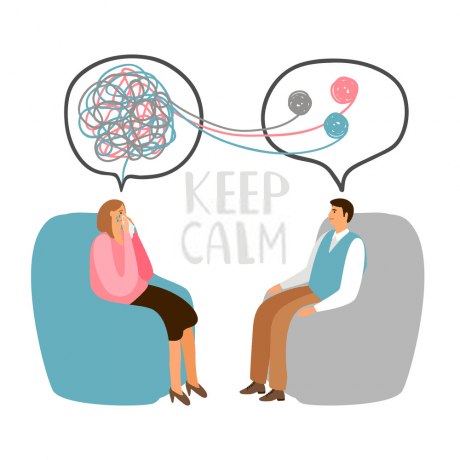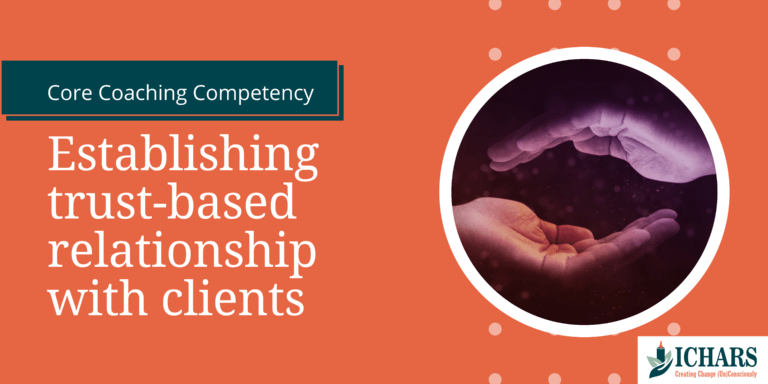In this in-depth look at the 4th CHC Core Coaching Competency, we would answer three important questions:
- What do we mean by a trust based relationship in coaching?
- Why is establishing a trust based relationship with a client, an important coaching competency? and
- How can a coach effectively establish a trust based relationship with a client?
What is the coaching competency of Trust-based Relationship mean?
This competency is all about creating a safe/supportive environment for the client which would ensure trust and mutual respect between the individuals involved. The therapist should also demonstrate genuine concern for the client’s personal welfare and future. This should be done in a way that does not seem forced and yet effective for the client. This will also help the therapist develop a strong rapport with the client thereby ensuring the therapeutic process goes smoothly.
Why is it important for a coach to establish a trust based relationship?

To understand what makes this coaching competency important, let us first explore what is the objective of a coach-client relationship?
A coach-client relationship enables the coach to help the client set and achieve goals.
To be able to do so, it is important for the client to discuss their
- Current situation
- Desired outcomes
- Strengths and weakness
- Past successes and failures
- Hindrances (in terms of lack of clarity, resources, skills, thoughts, feelings, beliefs….) that are coming in the way of creating and/or consistently following a systematic plan of action.
- And a lot more…
This discussion is only really possible when a coach is able to create a safe, supportive environment that allows ongoing mutual respect and trust. As a result of this positive and trust-based relationship with the coach, the client feels comfortable enough to have an unfiltered and open discussion.
Thus it is establishing this trust-based relationship that paves way for the client to experience the transformation that they desire and deserve.
How to establish and maintain a trust-based relationship with the clients?

To establish and maintain a trusting relationship with the clients, the coach should
- Show genuine concern for the client’s welfare and future.
- Demonstrate integrity, honesty, and sincerity.
- Establish clear agreements on expectations for both sides.
- Be honest and transparent in communication with the clients.
- Show genuine respect for the client’s belief system, individuality, learning style, etc.
- Support and champion new behaviors and actions taken in the direction of the goals.
- Ask permission to coach clients in new areas.
How does the Cognitive Hypnotic Coaching® help you build a trusting coach-client relationship?
Cognitive Hypnotic Coaching is a truly client-centric model of coaching.
In fact, it is client-led and begins with the belief that the client understands their life best. There is no place for the coach’s belief system, understanding of the world or opinions in this coaching framework.
Cognitive Hypnotic Coaching is a seamless integration of life coaching models and cognitive, behavioural and humanistic approaches from psychology along with NLP, Hypnosis, mindfulness, metaphors.
An integration of all these modalities and approaches allows the coach to not only help the client:
- Define the current reality and outcome and
- Create an action plan to start working towards it,
But also help the client expand their map of the world in order to overcome both conscious and unconscious hindrances in moving towards their goals.
The latter is what usually perplexes coaches and clients in standard life coaching models.
In addition, when you train in Cognitive Hypnotic Coaching, you also learn –
- How to follow the client’s map of reality (for example, how to proceed if the client is talking metaphorically)
- How to help the client expand their map with
- the art of asking the right questions, and
- effective listening,
- How to rapidly build rapport
- And more.
The trust between the coach and the client starts getting established with the pre-coaching session itself, where the coach helps the client understand –
- what is the coaching process
- how the coaching process will help them achieve the desired outcome
- the truth about any myths and misconceptions they may have about coaching or any of the modalities that make up Cognitive Hypnotic Coaching
- how the mind works, how our mental state affects our behaviours and our outcomes
- why it is important to work on the unconscious hindrances
- what is the typical duration of the coaching process and each session
- the importance of confidentiality in coaching and the fact that it shall be maintained during and after the coaching sessions are over
This makes the entire coaching journey very transparent and makes the client feel in charge of the process.

Another unique advantage with the Cognitive Hypnotic Coaching model is that many tools and processes used in coaching are content independent. In other words, the client need not always share the details of the problem with the coach unless they wish to do so.
This is extremely beneficial in settings where the client may not remember or may not feel comfortable sharing some aspects of the problem.
If you wish to learn more about this life coaching model, check out Cognitive Hypnotic Coaching model or schedule a call with us.


